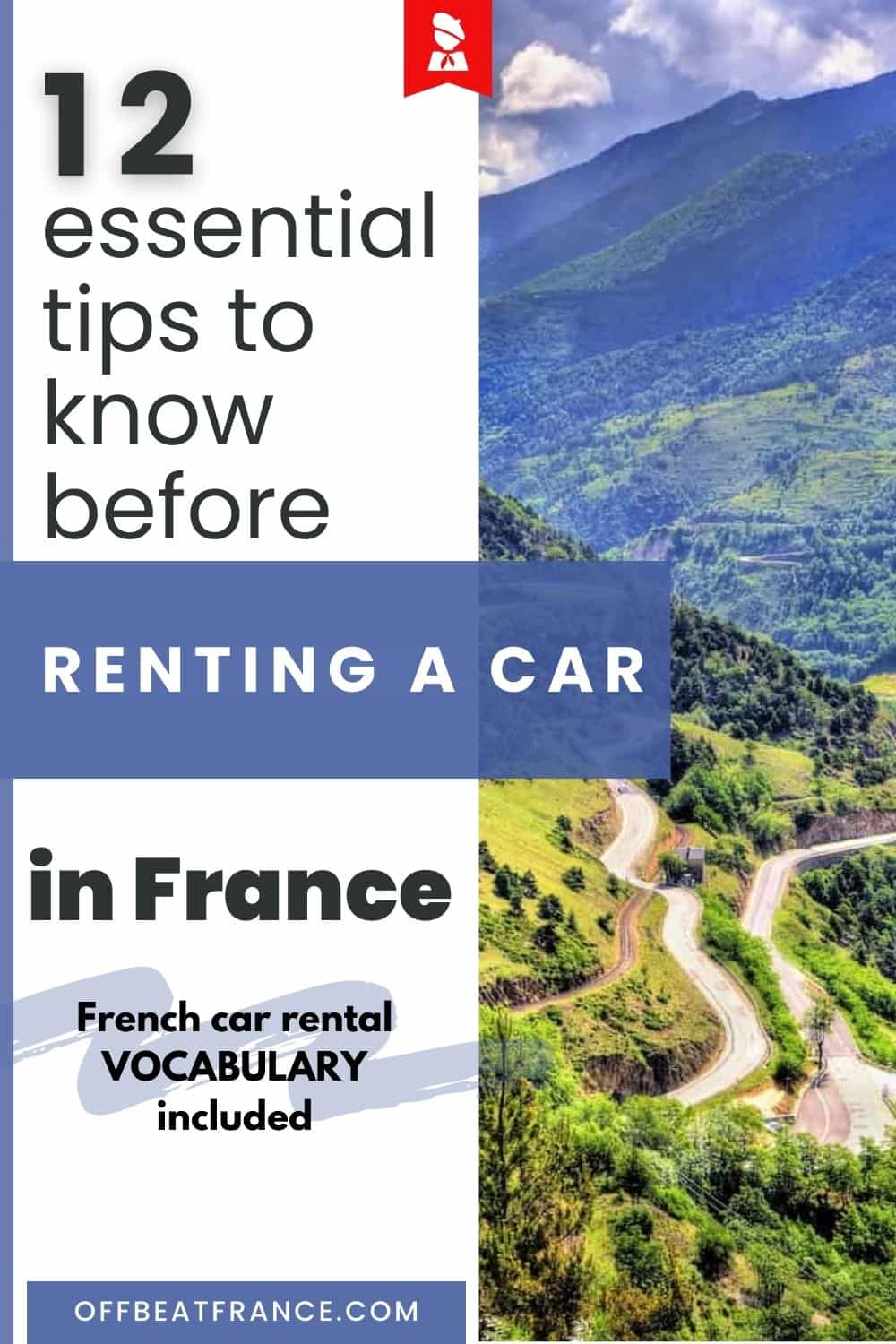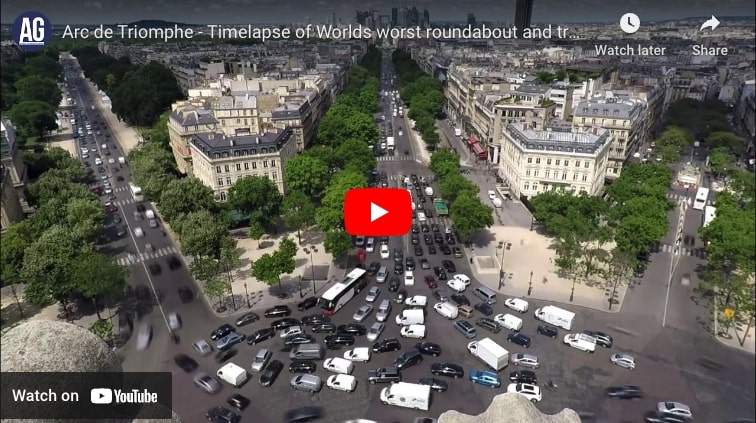Fascinated by Gallo-Roman history? Click Here to download > > > Here are 6 ways Rome affected France
- Home ›
- Plan Your France Trip ›
- Renting a Car
12 Vital Things To know before Renting a Car in France
Updated 3 May 2025 by Leyla Alyanak — Parisian by birth, Lyonnaise by adoption, historian by passion
As someone who has navigated the breadth of France by car, I can offer practical advice on renting a car in the country. This article covers everything you need to know, from legal requirements to tips for driving in France.
Picture those 1950s movies, where crimson convertibles race above the French Riviera, weave through lavender fields or climb towards abandoned fortresses.
You can absolutely do the same thing on a French road trip!
I live in France and have my own car, but this is a large country and driving from my home to a destination across the country isn't always convenient. Sometimes, I'll take a train and rent a car when I get there.
BOTTOM LINE: renting a car in France is a good idea if you're going to the countryside or where there is little public transportation. In cities, you won't need one.
🚗 NO TIME TO READ EVERYTHING?
🏷️ JUST WANT THE BEST CAR RENTAL FRANCE PRICES?
Before you rent, make sure you check prices – they can vary widely, so I check Discovercars to compare and come up with the best bargains.

12 Essential car rental in France tips
1. Know the costs and availability of your France car rental
2. Book early, especially if you want an automatic transmission
4. Pre-buy some paper maps of France and guidebook
5. Check you're booking the right car equipment
6. Choose the right kind of car for France
7. Choose the right kind of insurance
8. Decide where to rent and return your car
9. Some basic French driving rules are key
10. Road signs and tolls may be a challenge
11. Know what to do in an emergency
12. Make sure you actually NEED to rent a car in France
- Renting a car in the city
- Renting a car to visit the countryside
- Examples of when you need (or don't need) to rent a car in France
Pros and cons of renting a car in France
Best tips for renting a car in France
NOTE: Pages on this site may contain affiliate links, which support this site. See full Privacy Policy here.
12 Essential tips to find the best car rental in France
To make your road trip smoother and less stressful, here are 12 key tips every driver in France should know.
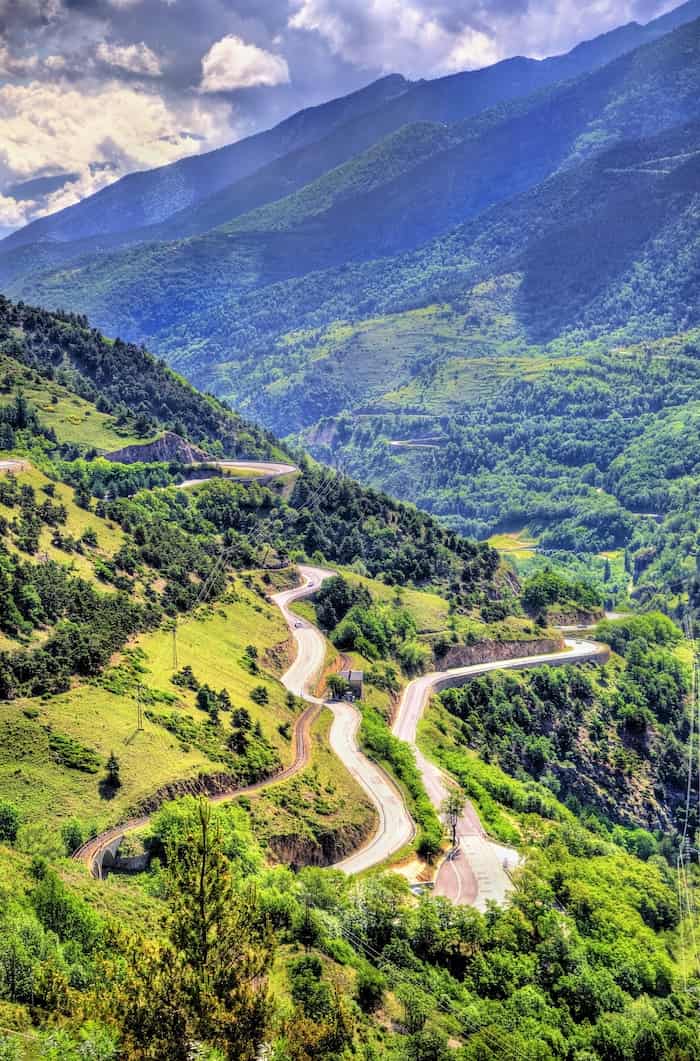 Some of France's most scenic spots can only be accessed by car
Some of France's most scenic spots can only be accessed by car1. Know the costs and availability of your car rental
Cost is a major factor in the decision to rent a car and the cost of hiring a car in France per day will vary. Compare car prices in France if you already know where you're going, and scan the page for car rental – France deals – which are often available.
Rental costs
There has been price creep and cheap rental cars in France are becoming rare. That said, you can still keep costs down:
- If you're offered an upgrade when you rent your car, think twice: a larger car will use more gas and cost more than a small car (not to mention those tiny roads and streets where you might get stuck).
- If you can, visit on the off-season or shoulder season. Car prices in France are much higher during the peak tourist season, and cars are scarcer then. Prices may also climb during French holidays, around Christmas, or in summer. Here are the best times to visit France.
- Examine different locations, because rental car prices change depending on the city and even within cities. Airports can be more expensive than downtown, which might be more expensive than a suburb, so compare prices before you decide.
PRO TIP ➽ Reserve your car early. Prices are usually lower when there is plenty of supply. The closer you get to holiday season, the scarcer – and more expensive – the car, especially if you want an automatic transmission. 🚗 CLICK HERE FOR YOUR CHEAP CAR RENTAL FRANCE
Renting a car in France can be a complicated affair, with plenty of rules. Here are just a few examples (but you'll have to check individual listings to make sure):
- Car rental companies will usually require a credit rather than a debit card, so make sure you have one, or check that the rental agency accepts debit cards.
- Cards issued by electronic or online banks are often not accepted.
- You may have to leave a hefty deposit on your card, which will be returned 30 days after you've handed in the car.
- Many rentals offer unlimited mileage, but not all. Check.
Additional costs
One thing to watch for are hidden or additional costs when renting cars in France.
- Equipment: cars are usually fully equipped but make sure it has everything you need – like GPS or baby or child seats – and if not, whether there's a cost.
- Unlimited mileage (kilométrage illimité): if you plan on driving relatively long distances, make sure your rental offers this option.
- Tax: VAT tax of 20% is usually included in the rental price, but you may have to pay additional VAT on extra services, like border crossing payments or additional drivers.
- You may want some extra insurance, which can be as expensive as the cost of the rental itself. Check if you're already covered by a policy at home.
- If paying for your rental on site (as opposed to online), make sure you check your currency conversions so that you don't get overcharged.
- Border crossings: If you're planning on traveling to a neighboring country, you'll have to tell them beforehand and there will usually be a small surcharge.
2. Book early, especially if you want an automatic transmission
As I mentioned earlier, cars become scarce during major holidays.
Also, most car rental transmissions are manual, with a stick shift, although the number of automatic cars available for rental in France is increasing.
Automatic transmissions usually cost more to rent, and they are less common.
Also, be aware that if you have a licence that only allows you to drive an automatic car, you won't be able to rent a stick shift car.
Be sure your car is an automatic before you reserve!
3. Cover the essentials
Each French car rental agency will have its own conditions and add-ons, which you'll have to check. They also have different age policies, fuel policies or driver requirements.
But what they all share is the list of basic documents you'll need for your rental:
- a valid ID, usually a passport
- a credit card with your name on it (remember, many car rental agencies don't accept debit cards for deposits, although this is slowly changing)
- a driver's licence of course – see below
- proof of insurance (or you'll have to buy some)
Requirements for driving in France are relatively straightforward and similar to those of other European countries.
Do you need an international driver's licence in France?
If you're from Europe or the EEA, your national driver's licence is all you'll need. If you're from outside Europe, the plot thickens.
If you run into trouble, have an accident or are checked by police, they need to be able to read your licence, and many do not read English, hence the need to have a licence in French.
If your licence isn't written in French – which will undoubtedly be the case if you're from an English-speaking country – you'll need a translation, but you'll have to get it before you leave home.
There are two ways to do this.
1) Get an International Driver's Permit (IDP) or licence (you can get one here).
2) Get an official, accredited translation of your licence from a translator listed with the French embassy. This is cumbersome and expensive, and an IDP is the better option (not to mention you'll be able to use it in other countries as well).
I do have to tell you that tourists are often able to rent a car with their own licences in English, but I wouldn't chance it. If you do get into a fix, help may be delayed and there may be insurance issues if you don't have the proper licence, so do yourself a favor and get the right paperwork before you leave home.
A few more car rental tips
- Your licence must be valid for at least one year from the rental date, and in many cases, you must have had a licence for at least a year before renting.
- Most agencies won't rent you a car if you're under 25 years old (a few will rent if you're between 21-25 but only at a higher cost, so check).
- If you're over a certain age (usually 65 or 69 but this too can vary), you may be charged extra, or some agencies might not rent to you at all. Your car rental comparison engine lists the age requirements for each car under "Rental Conditions".
4. Pre-buy some recent paper maps of France and guidebook
This may sound silly in this electronic day and age but you'll see the wisdom of it when the GPS takes you into a wheat field or down a street that has been pedestrianized for a couple of years.
GPS systems in cars can be notoriously antiquated and not always updated.
Also, there are often comprehension issues: street names will be mispronounced by the artificial intelligence, and you'll be looking for a road number while the GPS gives you a name.
Avoid all this hassle and get a physical map or road atlas. I have the French edition of the Michelin Road Atlas and I also use this Michelin map (along with plenty of regional and local maps).
5. Check you're booking the right car type and equipment
You'll find most any car available for rental in France, from tiny budget cars to luxury vehicles and electric or hybrid vehicles. Whatever you choose, there are a number of things to consider when renting your car in France.
Compulsory equipment
Most rental cars come with the necessary equipment but double-check, just to be sure:
- each car must be equipped with one fluorescent yellow vest for each person in the car
- a red emergency triangle to signal a breakdown
- spare brake lights (I've never understood this one but... it's the law) in a box in the trunk
Crit'Air sticker
If you plan to drive in cities, your car should have a Crit'Air sticker or vignette. What's that, you say?
In their efforts to reduce pollution, many cities have established a pollution grading system for cars. On particularly polluted days, the city may ban cars that don't meet Crit'Air 1 or 2 from their downtown core. Usually, the ban is up on an electronic bulletin board for all to see, at the entrance of the low-emission zone. Usually, but not always.
If you don't have a Crit'Air sticker on your car at all, or if the number is higher than 2, stay away from city centers, because in some, the ban is year-round.
That said, most rental companies renew their stock regularly so they'll have newer models, all of which meet the pollution criteria – and which should carry a sticker. Ask, because better safe than sorry.
Winter equipment
If you're driving in winter, some regions of France require you by law to have either snow tires or carry chains in the car. Make sure your car is equipped if you're planning to drive in any of these departments between 1 November and 31 March. This also applies even if you are simply driving through.
DEPARTMENTS REQUIRING SNOW TIRES
Ain (01), Allier (03), Alpes-de-Haute-Provence (04), Hautes-Alpes (05), Alpes-Maritimes (06), Ardèche (07), Ariège (09), Aude (11), Aveyron (12), Cantal (15), Corrèze (19), Corse-du-Sud (2A), Haute-Corse (2B), Côte-d’Or (21), Creuse (23), Doubs (25), Drôme (26), Gard (30), Haute-Garonne (31), Hérault (34), Isère (38), Jura (39), Loire (42), Haute-Loire (43), Lot (46), Lozère (48), Meurthe-et-Moselle (54), Moselle (57), Nièvre (58), Puy-de- Dôme (63), Pyrénées-Atlantiques (64), Hautes-Pyrénées (65), Pyrénées-Orientales (66), Bas-Rhin (67), Haut-Rhin (68), Rhône (69), Haute-Saône (70), Saône-et-Loire (71), Savoie (73), Haute-Savoie (74), Tarn (81), Tarn-et-Garonne (82), Var (83), Vaucluse (84), Haute-Vienne (87), Vosges (88), Yonne (89), Territoire de Belfort (90).
A last check
Before you drive off with your car from the rental agency, make sure you...
- know the car rental agency or insurance emergency number to call if you encounter a problem
- check the condition of your car, take photos or video of any damage or scratches
- check that everything works, from the GPS to the windshield wipers to the air conditioner (especially if you're headed to hot climates)
- find out what kind of fuel it uses and how the gas tank opens (you don't want to fumble to open the catch with everyone honking behind you)
- make sure you know where everything is, from hazard lights to wipers and defogger – this way you'll be prepared when you need them the most
- set your GPS to your first destination (and find it on your paper map, just in case)
- locate the nearest gas station to your drop-off point so you can fill up on your way back to return the car (ask the car rental people before you drive off)
- make sure you know where to hand in the keys and whether the gas tank has to be full
- have cash on you, in case your card isn't useable, for gas and tolls
6. Choose the right kind of car for France
A larger car may be more comfortable on the motorway but if you plan to visit France's most beautiful villages, many have tiny streets and scraping the wall with your mirror (or worse) isn't unheard of.
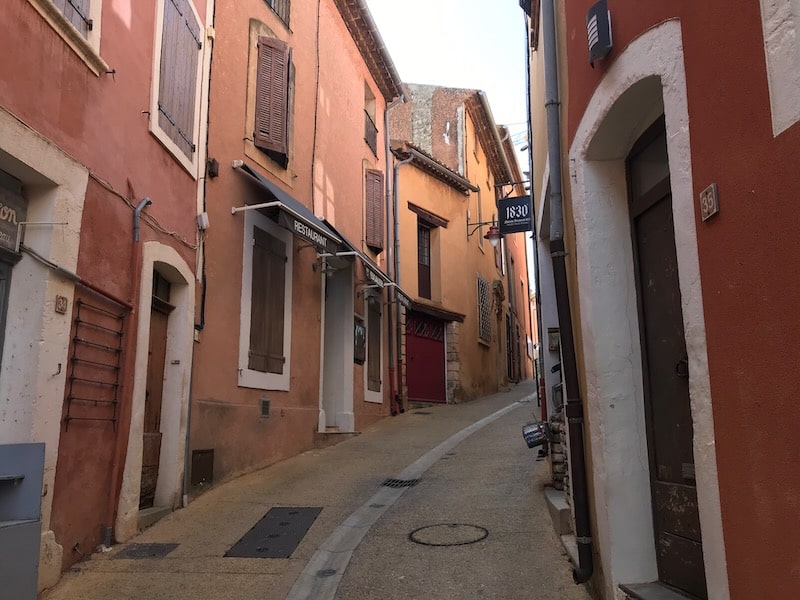 I almost didn't make it through this little street in the village of Roussillon in northern Provence
I almost didn't make it through this little street in the village of Roussillon in northern ProvenceRoads, too, can be narrow, with barely room for two-way traffic (you may even have to stop or even reverse to let someone by).
Also, parking garages are often tiny, and maneuvering in and out can be a nightmare (I speak from experience).
7. Choose the right kind of car rental insurance France
Insuring a car in France is not optional.
You definitely need insurance, because a shattered windscreen or minor dent can add up. Worse, you can hurt someone and be liable for their medical costs.
Discovercars provides the option to buy full insurance coverage but that said, you may not need the full package, so read the fine print.
Credit cards often provide car insurance coverage if you use their card for your rental, so check that first. If your card does provide insurance, make sure it includes some sort of roadside assistance.
You may already have some coverage through your homeowner's policy or your car insurance back home – or through an automobile association, if you belong to one.
Just know that in France, you MUST be insured to rent and drive a car: it's the law. But where you get your insurance is up to you.
8. Decide where to rent and return your car
Where you actually pick up your rental can make a difference.
A rule of thumb is this: in large cities, rent outside town or in a suburb, and in small towns, rent anywhere. This is because of heavy traffic in cities, where signposting is often poor and drivers impatient with slow-moving foreigners.
Probably the easiest is to rent from an airport car agency, if you're flying in − no need to battle downtown traffic (although, word of warning, airport rentals are sometimes more expensive).
Next in line is a TGV train station, which is often outside town.
If neither of these is possible, then try to rent at or near a train station in town. Streets around a station are traditionally well-signposted, and this should make your life marginally easier.
If the city has more than one station, pick the one closest to the direction you'll be driving towards.
Under no circumstance should you rent a car in Paris unless you're familiar with driving in the city. You wouldn't want to get caught in France's busiest roundabout, would you? I would also say the same of Lyon — it's easier than Paris but nerve-wracking nonetheless (and unnecessary).
I've been driving in France for decades (including in such driving black zones as Lyon or Nice) and you couldn't pay me enough to drive through central Paris.
Here, this is better than 1000 words:
And a few final tips about choosing your car rental agency:
- Before you decide, make sure the agency is open at the time you plan to pick up your car, over lunch, for example, or on weekends. Downtown agencies often keep store hours.
- Check car rental in France reviews. These days, no one is shy about signalling a rude receptionist or a dirty car, so find out what people are saying.
- Look the agency up on Google Earth, to get a sense of the traffic and the neighborhood.
- You can rent a car in one city and return it in another, but there will be a charge, and probably not an insignificant one.
9. Some basic French driving rules are key
IF YOU'RE PLANNING TO DRIVE IN FRANCE...
This online course is a quick and enjoyable way for you or your second driver to learn our driving rules. I live and drive in France, and even I learned things to make my road trips more enjoyable, safer and less stressful. Find out more here.
I have an entire article about driving a rental car in France (or any car, for that matter) and I encourage you to read it to get the fullest picture. Meantime, here are a few essential rules you need to know before you get on our French roads.
- The one rule that might confuse you more than others is the "priority on the right": anyone coming from the right has the right of way – even if they're coming into your road from a small street. The only exception is when your road is clearly marked as a priority road (a big yellow diamond with a black stripe running diagonally through it).
- Our speed limits are strict: 130kph on the autoroute, 80kph on normal roads, 50kph in town (and sometimes 30kph). For information, 10 kilometers per hour (kph) is 6 miles per hour.
- France does love its radars. In recent years, they've been going up like crazy! The only good news is that fixed radars are signalled, so you know they're up ahead. Mobile radars on police cars, on the other hand, are not.
- Oh, and don't even think of using a radar detector or GPS warning system. If caught, you might be fined up to 3000 Euros and even risk confiscation of your vehicle. Not a pleasant thought.
- If you do get a fine, pay it as soon as you can. Don't ignore it! It will be sent to your car rental company, which will simply deduct the amount from the credit card it has on file for you, along with a comfortable service charge. You may not even know you've been fined until after you've returned home.
- Be aware that chatting on your cellphone (or worse, texting) is illegal and also accompanied by a hefty fine.
- Welcome to the world of roundabouts. A few years ago there were hardly any. Now, they're everywhere but since they're relatively new, most people on the road still don't really know how to use them, so stay alert. Usually, the driver already IN the roundabout has priority – but not always (this will be signposted).
- These tips may be obvious, but seat belts are compulsory for everyone, just as drinking and driving is forbidden. The drinks limit is low in France: one drink and you've reached it. The fines are hefty and the risks high, so wait till dinnertime when you can walk back to you accommodations.

PRO TIP ➽ While you should always follow the speed limit signs on any road, be extra careful when you see THIS sign.
It means there's a speed radar nearby, and there's every chance it's active.
10. Road signs and tolls may be a challenge
While driving in France is not radically different from other countries, there are unfamiliar signs and (sometimes illogical) rules, and roads can be narrow and winding. A little knowledge may go a long way.
French road signs
You can see some of the main road signs here, or buy a complete guide to carry with you when you travel.
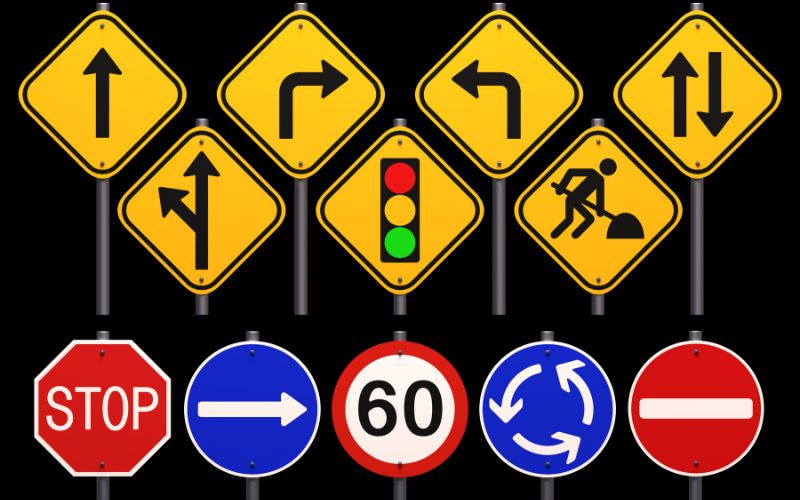 Road signs in France may be different, but they're usually understandable: red means don't, blue means do, and yellow means be careful
Road signs in France may be different, but they're usually understandable: red means don't, blue means do, and yellow means be carefulHow to use French toll roads
Most motorways are private, and each company sets its own price, which also can fluctuate from year to year.
There is an umbrella organization that groups all the highway companies but their website hasn't been updated since 2021. Your best bet is the Via Michelin route planner, which is updated frequently and can help calculate distance and costs for your entire journey.
The word for toll in French? PÉAGE. Signs usually start quite a ways before you reach the toll booths.
- To enter the motorway and get your ticket from the machine, press the big fat button that says "Ticket". Put the ticket away somewhere safe, behind your sun visor, for example.
- To leave the motorway, drive up to the machine, look for the blinking light and place your ticket in that slot (in the direction of the arrow, if there is one). It will calculate what you owe, and another light will blink, where you're supposed to deposit your cash or insert your credit card. And finally, another blinking light will ask if you want a receipt.
- Many of these machines have English instructions, but they may be hard to decipher for a first-timer (or if the sun is shining in your eyes) and it's best to know what to expect before you have to grapple with unfamiliar buttons. If you want your instructions in English, look for the button next to a Union Jack flag.
- Make sure you have cash. Have a few NEW crisp bills, because they have been known to reject old crumpled ones. You can pay with a card, but only with one that has a smart chip – and non-French cards aren't always compatible.
How to pay for a toll road
Some toll booths are enormous. Don't be intimidated. If you're entering the motorway, any machine will give you a ticket. If you're leaving it, then follow the signs below.
A green downward arrow is what you're looking for. This means all payments are accepted – cash, card or pass (you won't have a pass since you don't live here).
An orange "t" sign means you need a pass to enter. Not for you.
Two superimposed faint white credit cards or a hand holding a card mean you can pay with a smart card. Unless you have a French or an EU credit card with a smart chip, avoid these. The toll system doesn't take all cards, and if it doesn't like yours, it might swallow it and you may not get it back for weeks.
A red cross means do not enter.
A speed limit sign with an orange "t" is for pass-holders only, and means they can slow down and go through without stopping.
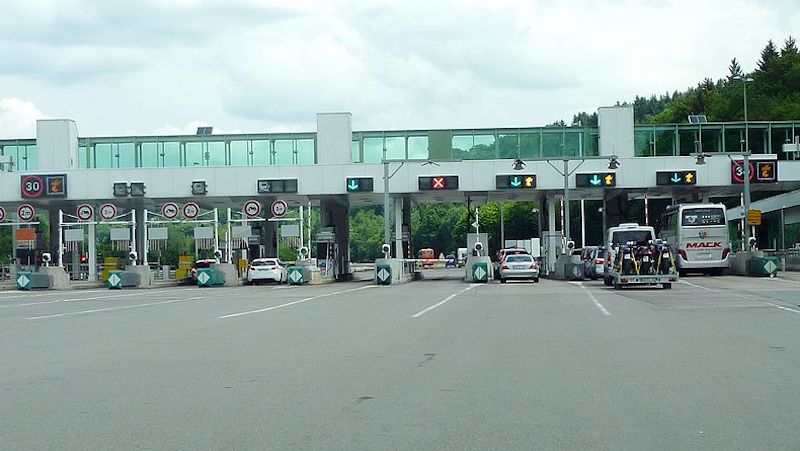 A variety of autoroute toll signs, from left: for orange T-pass only, slow down to 30kph; very faint credit card sign: pay with card only; green arrow means all methods of payment; red cross: do not enter; green arrow with orange-T means everyone can go through and pay with any method; and again, slow down with orange T-pass. Photo by BlueBreezeWiki, CC BY-SA 3.0, via Wikimedia Commons
A variety of autoroute toll signs, from left: for orange T-pass only, slow down to 30kph; very faint credit card sign: pay with card only; green arrow means all methods of payment; red cross: do not enter; green arrow with orange-T means everyone can go through and pay with any method; and again, slow down with orange T-pass. Photo by BlueBreezeWiki, CC BY-SA 3.0, via Wikimedia Commons11. Know what to do in an emergency
I mentioned earlier that one of the first things you should do is note the emergency numbers to call for both your car rental and your insurance.
In an emergency, if it's a serious threat, call the police first. The number (it's the same across Europe) is 112. As soon as you can when things begin to clear, call the insurance and your car rental agency.
It would be good to have a translation app on your phone, one you can use to relay a message in French if needed.
Be sure you have a connection and internet access in France. If you have an unlocked phone, you can use a digital SIM card for this purpose.
12. Make sure you actually NEED to rent a car in France
I hate to bring it up, but do you really need to rent a car? There are strong arguments for and against, and I'll lay them out here for you.
Renting a car in the city
If you're visiting mostly cities, then no, you don't need a rental car in France. In fact it would be more of a hindrance than a help.
Public transportation is plentiful and parking in French cities is difficult: ceilings are low, parking spots can be tiny, prices are sky-high.
The excellent train network will reach most cities and towns in France.
 France's large cities - like Lyon - are best seen without a car
France's large cities - like Lyon - are best seen without a carRenting a car to visit the countryside
If you plan on visiting the countryside and don't have your own car, then yes, renting a car in France makes perfect sense.
Some regions simply require a car, places like the Alps, its villages filled with narrow streets and linked by winding mountain roads, or wild places, like the Ardèche, with its rushing rivers and not a train station in sight.
Should I rent a car in France? When you need a car in France (and when you don't)
For Paris: No. Never. Not. Renting a car in Paris is a bad idea.
For Lyon: Not for the city but if you want to take day trips to places you can't reach by car, rent from the airport. You'll see that most of the things to do in Lyon can be accessed by public transport.
For Burgundy: For city hops to Dijon or Beaune, no car is needed. But if you plan on driving the Route des Grands Crus and sample Burgundy wines along the way, then most certainly, yes. Or, you could rent a bike for part of the route.
For the French Riviera: Not in summer, when roads are bloated with traffic and driving is crazy. Along the coast, just use the train. Off-season, yes, a car is wonderful, for example if you want to follow trails like the Mimosa Route.
For Provence: Provence is one of those iconic regions whose tiniest corners beg to be visited, but which cannot be seen without a car. So yes, you do need a car in the south of France. Public transportation is scarce, especially to places like the hilltop villages of the Luberon.
If you're headed to Provence, here's my ten-day south of France itinerary to help you plan a fabulous trip!
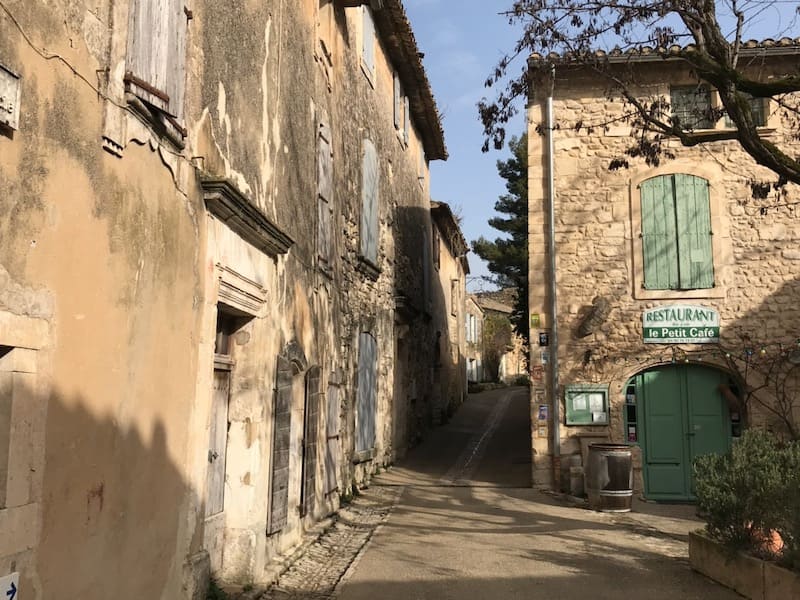 Some of France's most beautiful villages require a car to reach
Some of France's most beautiful villages require a car to reachFor the Basque region: No need for a car if you're sticking to towns like Bayonne, Biarritz, Saint-Jean-de-Luz. The gorgeous interior, however, does require a car, especially for if you want to take a Basque country road trip.
For the Loire Valley chateaux: A few of the chateaux can easily be reached on a day trip tour from Paris, or by train if you're headed to Blois or Amboise. But for a longer visit or to see some of the more remote chateaux, a car is needed.
For Brittany: Yes, you'll need a car. You can catch the train to one of the main cities, but Brittany is so much more than pretty villages.
THE BEST GUIDEBOOKS TO ROAD TRIP WITH YOUR FRANCE RENTAL CAR
Getting some of this knowledge ahead of time will help! If you wait till you get here, you might find most available guidebooks are in French.
➽ Lonely Planet's Best Road Trips France
➽ DK Witness Road Trips France
➽ Any of the Green Guides series - they all have excellent regional itineraries, which I use
Pros and cons of renting a car in France
Still undecided?
Pros: You should hire a car in France because...
- Public transport is not that great outside main cities so if you plan to branch out and explore, you'll need a car.
- You'll be able to see things that are less crowded and a little more off-the-beaten track, because most visitors to France do not come by car.
- Roads are excellent and well signposted, and driving isn't too different from what you're used to once you master the odder basics.
- Having your own car will give you the freedom to come and go as you please, without being dependent on transport schedules or availability, not to mention avoiding France's frequent transport strikes.
- You'll save many hours of waiting in stations and airports – just get into your car and go!
- And if you DO decide to rent a car, make sure you get my cheat sheet – it lists the key French driving rules you need to know, and has tips to remind you of the essentials.
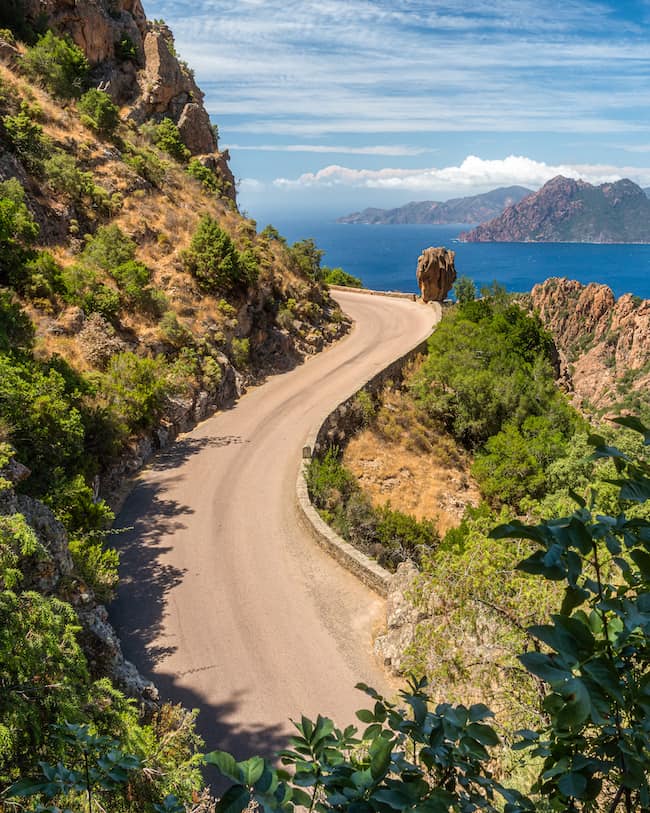 You'll go off the beaten path with a car rent in France, much more so than you would if you stayed on the main highways
You'll go off the beaten path with a car rent in France, much more so than you would if you stayed on the main highwaysCons: Don't rent a car in France because...
- The cost of rental and fuel have climbed significantly in recent years.
- Cars are almost useless in large cities. Parking is expensive and often scarce, streets can be narrow, and traffic haphazard. Not only that, but many French cities now have pollution controls which ban certain types of car from the city center.
- In high season, popular roads can get very crowded and parking near attractions scarce.
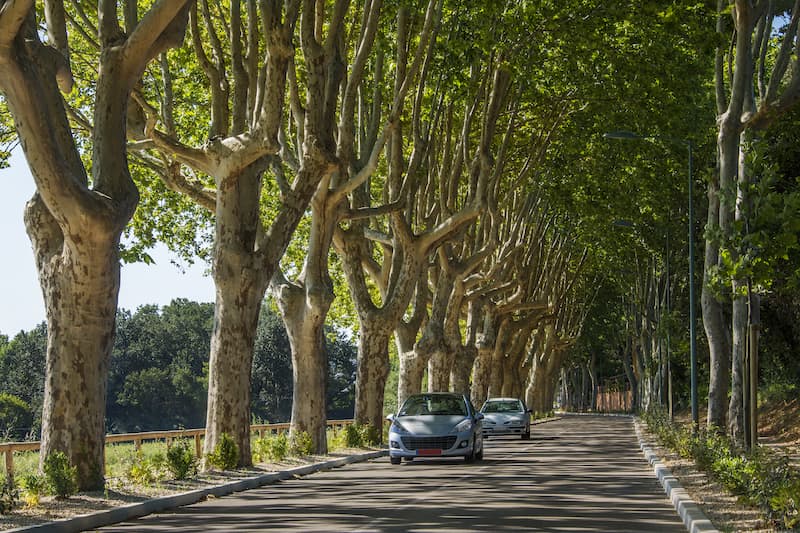
➽ I don't always drive my own car around France. To rent, I first check Discovercars, which searches ALL car rental agencies for the best deals. 🚗
Best tips for renting a car in France
I think I've covered most things you need to know about renting a car in France BUT... here are even more driving in France tips you'll be happy to know.
On the road
- When you're filling up with gas, try to do it far from the motorway: prices will be cheaper.
- Be mindful when paying. Some gas pumps may not take a foreign credit card, or will only take one with a smart chip.
- Keep your rental car as clean as possible. While "normal" wear is expected during your rental, you may be charged for cleaning if you hand it back truly messy.
- Check the fuel return policy. It is usually cheaper for you to fill up the car with fuel yourself at the end of your trip than to let the rental agency do it.
- And finally, tolls and gas. The cost of French toll roads can be extremely high, and on some stretches toll charges are higher than gas. Consider taking side roads for those bits: the Via Michelin website will calculate mileage and costs for you based on which roads you choose. Not to mention that much of France's beauty lies away from the major roads...
Driving at night tips
- If you plan to drive at night, try to fill up your gas tank early in the evening to make sure gas stations are fully open.
- Some gas stations are closed at night, perhaps they've run out of fuel or for some other reason, but that may mean there's a significant distance between pumps, so don't let your gauge drop below half-full.
- Be aware that some service stations close or reduce their services at night. This means you'll either have to pay in advance before filling up or use your card in the automatic machine.
- Some stations don't have human attendants at night so if your card doesn't work, well...
- Try to stay off the roads on Friday and Saturday nights. Despite the law, drinking and driving is sadly still common in France and I don't feel very safe on the road once everyone is heading home from a bar or disco on the weekend.
French car rental vocabulary
How do you say car in French? Or automatic transmission?
Here are a few words and terms that might be of use when you rent a car in France. I've added a short voice recording so you know how to pronounce these!
- Location - rental
- Boite manuelle / transmission automatique - manual transmission / automatic transmission
- La clim - air conditioning
- Un accident - an accident
- Un vol - a theft
- Assurance - insurance
- Carte de credit - credit card
- Où - where
- Quand - when
- Combien - how much
- Une décapotable - a convertible
- Un quatre-quatre - a four-wheel drive
- Gazole - diesel
Renting a French car: FAQ
Can you rent a car in France with a US licence?
Can you rent a car in France with a US licence?
Renting a car in France as an American usually requires an IDP, or International Driving Permit, available from your AAA. However, a number of agencies will accept an official translation of your licence, and at times will also accept just your licence. (Renting a car in France as a Canadian follows the same process.)
To find out documentation for a hire car in France, go to Discovercars, Search for the car that interests you, and check the "Rental Conditions" section to see what kind of paperwork you need.
Can you rent a car in France and drive to Italy/Switzerland/Germany/Spain?
Can you rent a car in France and drive to Italy/Switzerland/Germany/Spain?
Yes, but you need permission from your rental agency. You must let rental companies know you plan to cross a border, and there may be an additional border crossing fee to pay.
There might also be rental car rules in the other country, or driving rules. For example, in Switzerland you need to have an autoroute sticker on your car. Otherwise, you have to stay on secondary roads. You can buy the sticker at the post office or any border stop.
Can you rent a car in France at 18? How old do you have to be to rent a car in France? What's the minimum age to rent a car in France?
Can you rent a car in France at 18? How old do you have to be to rent a car in France? What's the minimum age to rent a car in France?
The driving age is 18 but the car rental age in France is usually 25, although some agencies may let you rent a car at 21.
Can a tourist rent a car in France?
Can a tourist rent a car in France?
Absolutely, as long as you fulfil the requirements and have the right documents.
How much is a France rental car? Is it expensive to rent a car in France?
How much is a France rental car? Is it expensive to rent a car in France?
Renting a car in France is moderate to expensive when compared to other countries. For example, Paris is more expensive than Madrid or London but less expensive than Rome and much less expensive than New York City or Chicago. You can comparison shop and find reasonable rates here.
Which is the cheapest car rental option in France?
Which is the cheapest car rental option in France?
That depends on where you rent, for how long, and the kind of car. Compare these various factors to find the cheapest car rental.
What are the rules for renting a car in France? What documents do I need to rent a car in France?
What are the rules for renting a car in France? What documents do I need to rent a car in France?
You need to have a valid driver's licence, be over 25, have a credit card and have insurance.
Do I need an international drivers license to rent a car in France?
Do I need an international drivers license to rent a car in France?
Officially, you do, and having one will ensure you a hassle-free rental. However, many agencies will accept an official translation of your driver's licence, and some will also accept a licence. Check the "Rental Conditions" section of rental cars to be sure. A follow-up email or call would be useful to get a confirmation.
Does car rental in France include insurance? Do you need extra insurance to drive in France?
Does car rental in France include insurance? Do you need extra insurance to drive in France?
Car rentals in France do not include insurance, but insurance is compulsory. You can buy it directly when you rent, or you can use the insurance that comes with your credit card or home insurance policy.
Can you rent a car in France without a credit card?
Can you rent a car in France without a credit card?
Not often − but it's changing. Some of the major car rental companies are slowly beginning to accept debit cards, but check first, because it's still more the exception than the rule.
How safe is it to rent a car in France?
How safe is it to rent a car in France?
Perfectly safe. Rip-offs are few, and I've found agencies to be honest across the country (there may be a few rotten apples, but that's the case everywhere).
The only challenge in renting a French car is the actual driving. In most parts of the country, driving is quite straightforward, and will probably feel quite familiar. But there are exceptions, such as strange rules and odd behaviour, and my piece on driving in France paints an honest picture of my country's habits behind the wheel.
Bon voyage!
Enjoy your drive through France, a country whose beauty lies mostly away from its main roads. Here are some sensational French road trips to prove it!
SHORTCUTS TO POPULAR CAR RENTALS ACROSS FRANCE
➽ Car rental PARIS France
➽ NICE AIRPORT car rental
➽ Car rental BORDEAUX
➽ Car rental AIX EN PROVENCE
➽ Car rental LYON
Before you go...
Don't let renting a car in France scare you! It's no more complicated than renting a car anywhere else. And now that you're thinking of going for it, consider taking one of these 9 fabulous French road trips!
Essential France travel resources
BOOK YOUR ACCOMMODATIONS
I use booking.com: for their huge inventory and for their easy cancellation policies
FLIGHT DELAYED OR CANCELED?
AirHelp can get you compensation (it works, I've used it)
DO YOU NEED AN E-SIM CARD FOR FRANCE?
Here's the one I use when I travel anywhere
PROTECT YOUR BELONGINGS
Keep pickpockets away with an anti-theft purse or an infinity scarf - and your identity with a VPN (I'm using Nord VPN)
TRAVEL INSURANCE
Travelers recommend Visitors' Coverage or SafetyWing. for health away from home
GETTING FROM A TO B
I use Discovercars to rent cars and either Omio or RailEurope for train tickets
TO READ ABOUT FRANCE
Here's my long list of books about France
AND DON'T FORGET...
To bring a guidebook for France!
Did you enjoy this article? I'd love if you shared it!
